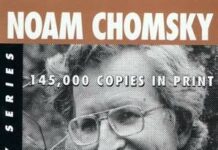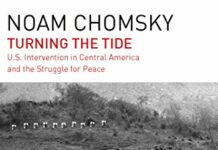
Ebook Info
- Published: 2004
- Number of pages: 304 pages
- Format: PDF
- File Size: 2.92 MB
- Authors: Noam Chomsky
Description
“Reading Chomsky today is sobering and instructive . . . He is a global phenomenon . . . perhaps the most widely read voice on foreign policy on the planet.” -The New York Times Book ReviewAn immediate national bestseller, Hegemony or Survival demonstrates how, for more than half a century the United States has been pursuing a grand imperial strategy with the aim of staking out the globe. Our leaders have shown themselves willing-as in the Cuban missile crisis-to follow the dream of dominance no matter how high the risks. World-renowned intellectual Noam Chomsky investigates how we came to this perilous moment and why our rulers are willing to jeopardize the future of our species.With the striking logic that is his trademark, Chomsky tracks the U.S. government’s aggressive pursuit of “full spectrum dominance” and vividly lays out how the most recent manifestations of the politics of global control-from unilateralism to the dismantling of international agreements to state terrorism-cohere in a drive for hegemony that ultimately threatens our existence. Lucidly written, thoroughly documented, and featuring a new afterword by the author, Hegemony or Survival is a definitive statement from one of today’s most influential thinkers.
User’s Reviews
Editorial Reviews: Review “If, for reasons of chance, or circumstance (or sloth), you have to pick just one book on the subject of the American Empire, I’d say pick this one. It’s the Full Monty. It’s Chomsky at his best. Hegemony or Survival is necessary reading.” ―Arundhati Roy“Reading Chomsky today is sobering and instructive.” ―Samantha Power, The New York Times“Highly readable…cogent and provocative.” ―Publishers Weekly About the Author Noam Chomsky is the author of numerous bestselling political works, including Hegemony or Survival and Failed States. A laureate professor at the University of Arizona and professor emeritus of linguistics and philosophy at MIT, he is widely credited with having revolutionized modern linguistics. He lives in Tuscon, Arizona. Excerpt. © Reprinted by permission. All rights reserved. Hegemony or SurvivalAmerica’s Quest for Global DominanceBy Noam ChomskyHenry Holt and CompanyCopyright © 2003 Aviva Chomsky, Diane Chomsky, and Harry ChomskyAll right reserved.ISBN: 0-8050-7688-3Chapter OnePriorities and ProspectsA few years ago, one of the great figures of contemporarybiology, Ernst Mayr, published some reflections on thelikelihood of success in the search for extraterrestrialintelligence. He considered the prospects very low. Hisreasoning had to do with the adaptive value of what we call”higher intelligence,” meaning the particular human form ofintellectual organization. Mayr estimated the number ofspecies since the origin of life at about fifty billion, onlyone of which “achieved the kind of intelligence needed toestablish a civilization.” It did so very recently, perhaps100,000 years ago. It is generally assumed that only one smallbreeding group survived, of which we are all descendants.Mayr speculated that the human form of intellectualorganization may not be favored by selection. The history oflife on Earth, he wrote, refutes the claim that “it is betterto be smart than to be stupid,” at least judging by biologicalsuccess: beetles and bacteria, for example, are vastly moresuccessful than humans in terms of survival. He also made therather somber observation that “the average life expectancy ofa species is about 100,000 years.”We are entering a period of human history that may provide ananswer to the question of whether it is better to be smartthan stupid. The most hopeful prospect is that the questionwill not be answered: if it receives a definite answer, thatanswer can only be that humans were a kind of “biologicalerror,” using their allotted 100,000 years to destroythemselves and, in the process, much else.The species has surely developed the capacity to do just that,and a hypothetical extraterrestrial observer might wellconclude that humans have demonstrated that capacitythroughout their history, dramatically in the past few hundredyears, with an assault on the environment that sustains life,on the diversity of more complex organisms, and with cold andcalculated savagery, on each other as well.Two SuperpowersThe year 2003 opened with many indications that concerns abouthuman survival are all too realistic. To mention just a fewexamples, in the early fall of 2002 it was learned that apossibly terminal nuclear war was barely avoided forty yearsearlier. Immediately after this startling discovery, the Bushadministration blocked UN efforts to ban the militarization ofspace, a serious threat to survival. The administration alsoterminated international negotiations to prevent biologicalwarfare and moved to ensure the inevitability of an attack onIraq, despite popular opposition that was without historicalprecedent.Aid organizations with extensive experience in Iraq andstudies by respected medical organizations warned that theplanned invasion might precipitate a humanitarian catastrophe.The warnings were ignored by Washington and evoked littlemedia interest. A high-level US task force concluded thatattacks with weapons of mass destruction (WMD) within theUnited States are “likely,” and would become more so in theevent of war with Iraq. Numerous specialists and intelligenceagencies issued similar warnings, adding that Washington’sbelligerence, not only with regard to Iraq, was increasing thelong-term threat of international terrorism and proliferationof WMD. These warnings too were dismissed.In September 2002 the Bush administration announced itsNational Security Strategy, which declared the right to resortto force to eliminate any perceived challenge to US globalhegemony, which is to be permanent. The new grand strategyaroused deep concern worldwide, even within the foreign policyelite at home. Also in September, a propaganda campaign waslaunched to depict Saddam Hussein as an imminent threat to theUnited States and to insinuate that he was responsible for the9-11 atrocities and was planning others. The campaign, timedto the onset of the midterm congressional elections, washighly successful in shifting attitudes. It soon droveAmerican public opinion off the global spectrum and helped theadministration achieve electoral aims and establish Iraq as aproper test case for the newly announced doctrine of resort toforce at will.President Bush and his associates also persisted inundermining international efforts to reduce threats to theenvironment that are recognized to be severe, with pretextsthat barely concealed their devotion to narrow sectors ofprivate power. The administration’s Climate Change ScienceProgram (CCSP), wrote Science magazine editor Donald Kennedy,is a travesty that “included no recommendations for emissionlimitation or other forms of mitigation,” contenting itselfwith “voluntary reduction targets, which, even if met, wouldallow US emission rates to continue to grow at around 14% perdecade.” The CCSP did not even consider the likelihood,suggested by “a growing body of evidence,” that the short-termwarming changes it ignores “will trigger an abrupt nonlinearprocess,” producing dramatic temperature changes that couldcarry extreme risks for the United States, Europe, and othertemperate zones. The Bush administration’s “contemptuous passon multilateral engagement with the global warming problem,”Kennedy continued, is the “stance that began the longcontinuing process of eroding its friendships in Europe,”leading to “smoldering resentment.”By October 2002 it was becoming hard to ignore the fact thatthe world was “more concerned about the unbridled use ofAmerican power than … about the threat posed by SaddamHussein,” and “as intent on limiting the giant’s power as … in taking away the despot’s weapons.” World concernsmounted in the months that followed, as the giant made clearits intent to attack Iraq even if the UN inspections itreluctantly tolerated failed to unearth weapons that wouldprovide a pretext. By December, support for Washington’s warplans scarcely reached 10 percent almost anywhere outside theUS, according to international polls. Two months later, afterenormous worldwide protests, the press reported that “theremay still be two superpowers on the planet: the United Statesand world public opinion” (“the United States” here meaningstate power, not the public or even elite opinion).By early 2003, studies revealed that fear of the United Stateshad reached remarkable heights throughout the world, alongwith distrust of the political leadership. Dismissal ofelementary human rights and needs was matched by a display ofcontempt for democracy for which no parallel comes easily tomind, accompanied by professions of sincere dedication tohuman rights and democracy. The unfolding events should bedeeply disturbing to those who have concerns about the worldthey are leaving to their grandchildren.Though Bush planners are at an extreme end of the traditionalUS policy spectrum, their programs and doctrines have manyprecursors, both in US history and among earlier aspirantsto global power. More ominously, their decisions may not beirrational within the framework of prevailing ideology and theinstitutions that embody it. There is ample historicalprecedent for the willingness of leaders to threaten or resortto violence in the face of significant risk of catastrophe.But the stakes are far higher today. The choice betweenhegemony and survival has rarely, if ever, been so starklyposed.Let us try to unravel some of the many strands that enter intothis complex tapestry, focusing attention on the world powerthat proclaims global hegemony. Its actions and guidingdoctrines must be a primary concern for everyone on theplanet, particularly, of course, for Americans. Many enjoyunusual advantages and freedom, hence the ability to shape thefuture, and should face with care the responsibilities thatare the immediate corollary of such privilege.Enemy TerritoryThose who want to face their responsibilities with a genuinecommitment to democracy and freedom – even to decent survival- should recognize the barriers that stand in the way. Inviolent states these are not concealed. In more democraticsocieties barriers are more subtle. While methods differsharply from more brutal to more free societies, the goals arein many ways similar: to ensure that the “great beast,” asAlexander Hamilton called the people, does not stray from itsproper confines.Controlling the general population has always been a dominantconcern of power and privilege, particularly since the firstmodern democratic revolution in seventeenth-century England.The self-described “men of best quality” were appalled as a”giddy multitude of beasts in men’s shapes” rejected the basicframework of the civil conflict raging in England between kingand Parliament, and called for government “by countrymen likeourselves, that know our wants,” not by “knights and gentlementhat make us laws, that are chosen for fear and do but oppressus, and do not know the people’s sores.” The men of bestquality recognized that if the people are so “depraved andcorrupt” as to “confer places of power and trust upon wickedand undeserving men, they forfeit their power in this behalfunto those that are good, though but a few.” Almost threecenturies later, Wilsonian idealism, as it is standardlytermed, adopted a rather similar stance. Abroad, it isWashington’s responsibility to ensure that government is inthe hands of “the good, though but a few.” At home, it isnecessary to safeguard a system of elite decision-making andpublic ratification – “polyarchy,” in the terminology ofpolitical science – not democracy.(Continues…)Excerpted from Hegemony or Survivalby Noam Chomsky Copyright © 2003 by Aviva Chomsky, Diane Chomsky, and Harry Chomsky. Excerpted by permission. All rights reserved. No part of this excerpt may be reproduced or reprinted without permission in writing from the publisher.Excerpts are provided by Dial-A-Book Inc. solely for the personal use of visitors to this web site. Read more
Reviews from Amazon users which were colected at the time this book was published on the website:
⭐Might help to go into this book knowing that Chomsky always has the same theme in his books and talks – the US is duplicitous in its foreign policy and neither government nor corporations can be trusted. Even if other governments are bad, we must criticize ourselves first (getting the plank out of our own eye before helping with the speck in another’s eye).Could people in other powerful countries write such criticism of their own governments? No. Evidence that the US is a place of freedom despite its shortcomings. (my comment, not author’s theme)5/5 stars
⭐An absolutely enlightening assessment of U.S. policies that is a must-read whether you are a student of history, seeking to make sense of the how we’ve gotten to this point today where we spend more on military than the next top 5 spenders combined and neglect our homeland while funneling billions abroad, or just interested in being an informed citizen wary of the propaganda and narrative the U.S. spins of how we are the exceptional “indispensable nation” that protects freedom globally and is the worlds police. To the contrary, Chomsky makes clear we will do anything to protect our interests (interests ranging from protecting multinational corporations, securing natural resources for next to nothing, forcing open markets, ensuring friendly governments are in power in an ever-expanding definition of “strategic” countries by all means necessary and support us in all we do in a “you’re either with us or against us” mentality, and much more) including overthrowing democratically elected governments either directly or by supporting rebel and/or terrorist groups, supporting dictators who commit incredibly atrocious crimes against humanity, risk the very annihilation of our species with nuclear war, and much more abhorrent acts that we ascribe only to totalitarian regimes.Combined with Chomsky’s other work, particularly “Manufacturing Consent” that speaks of how the government secures our willingness in this enterprise using the media as its propaganda tool deceptively brilliantly, you can quickly learn how we are not who we think we are, be more aware of attempts to manipulate your opinion and avoid such traps, and be an agent of change, among many important lessons. I strongly recommend these books if you seek any of this, and especially if you are at a loss as to why we do what we do, how we do it, and seek to rise above the traps many have fallen victim to.Even if you vehemently disagree with Chomsky, not to read him is, as The Nation reviews, “to court genuine ignorance.” For he is, as the New York Times points out, “arguably the most important intellectual alive.”
⭐Noam Chomsky, a well-known left-wing academic, writes here about globalization’s political impact as a main point of the U.S. foreign policy. Political economics is very sensitive subject, but Chomsky in this book attacks as he argues that U.S. foreign policy has been imperialist and heavy handed since World War I. He speaks of that in the invasion of Iraq, and elsewhere, the U.S. disregarded the U.N. as well as public opinion at home and abroad. Chomsky makes important points, but I feel he would have a larger and politically more diverse audience if he developed a more detailed andd less harsh sounding writing style, provided more background on some events he covers, particularly America’s political and military interventions. He is provocative, harsh and very negative about the U.S. even calling us a “terrorist state.” For me despite beliefs very different from my own this book helped me to gain more and a better insight into our country’s politics
⭐An excellent book, meticulously documented and precisely supported with references and footnotes by Noam Chomsky- developing – and addressing – the question of whether the existence of humans will continue, or turn out to have been an evolutionary mistake as having been too “smart” and destructive [a] for our own survival and/or [b] too damaging to the habitat to permit the survival of not only the species, but life itself. The book explicates the extent to which a biological “crash” would bring down the habitat for all of life on Earth. This is NOT a “science fiction” book forecasting a dystopian future of possible survivors in a post-atomic war, trying to recreate “civilization” [to rebuild for the next atomic war?], but addresses the reality that all life on earth could be extinguished by the actions of a single life form – our own.A clearly written, and sobering analysis of what our [potentially limited] future may be if we [or our “leaders”] do not understand or accept scientific and political realities, with all life on earth being held – literally – in the balance. Should be required reading for anyone running for office – from School Board to President. A rational, insightful and brilliant text: no surprise for a Chomsky book.
⭐Noam Chomsky is a unique being who has ingested vast amounts of information and arrived at contrary conclusions about the history and state of this country.. Although we see ourselves as a beneficent power, he reveals the reality. Many other writers have also written sobering evaluations of our economy, our government, the recent wars, and the military-industrial complex. It’s a shame that our politicians seem short on intellectual curiosity and adhere to old formulations. (Which just happen to be very profitable for them.)It will be too bad for us when he is no longer around to urge us to think more clearly.
⭐Written in 2004 so primarily influenced by the Bush era but it is as or even more valid today in the Trump era. Perhaps Chomsky has taken a darker view than some but this does reveal an underlying current in American politics which must no doubt come to a head in the 21st century. Troubling but important reading, and as always with Chomsky – well thought out.
⭐shortly after 9/11 i was hungry for books and knowledge to educate myself about the world we live in. although i was still very young i was one of those unfortunate souls who believed i was already informed and well-read. i would have argued to the death that i was right because i thought i was. “i watch the news, i watch documentaries, i do know what’s happening…” and then i discovered noam chomsky. hegemony or survival was the first chomsky work that i read. and it knocked me sideways. if you’ve never read anything like this before, but think you know what’s happening out there, this book is intellectually devastating. the thing that sets chomsky apart is that he only deals in documented facts. there is no debate to be had. this man has more integrity in his little finger than the entire western world’s corporate mainstream media has combined. he is a walking encyclopedia. i gave this book away to a friend one evening and told him trust me, just read it. he text me around 6am the next morning. the text said simply “this book is incredible.”
⭐Chilling. Shocking. Enraging. Depressing. Everyone in the West should read this book and understand the cynical decisions taken by US governments and their lackey states over many, many years. It might help us to answer the question, ‘why do they hate us?’ Equally important is to understand how the mainstream media fails to do its job – keep account of the politicians, military industries and economic elites. This book made me angry but it also made me depressed because I felt so helpless in the face of such huge abusive power.
⭐To know your real enemy is to prepare to defeat him. The West has behaved disgracefully towards Iraq and today it tries to tell us China is our great enemy using the well tested political deceit.
⭐One book that has changed my world view. I can’t believe how stupidly naive I was.Don’t read this unless you want to understand how the capitalist world works and how governments operate a totally two faced game with the electorate. It can be depressing, enlightening and personally empowering in equal measure.You won’t be the same afterwards.
Keywords
Free Download Hegemony or Survival: America’s Quest for Global Dominance (American Empire Project) in PDF format
Hegemony or Survival: America’s Quest for Global Dominance (American Empire Project) PDF Free Download
Download Hegemony or Survival: America’s Quest for Global Dominance (American Empire Project) 2004 PDF Free
Hegemony or Survival: America’s Quest for Global Dominance (American Empire Project) 2004 PDF Free Download
Download Hegemony or Survival: America’s Quest for Global Dominance (American Empire Project) PDF
Free Download Ebook Hegemony or Survival: America’s Quest for Global Dominance (American Empire Project)





